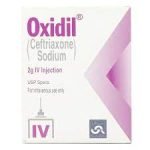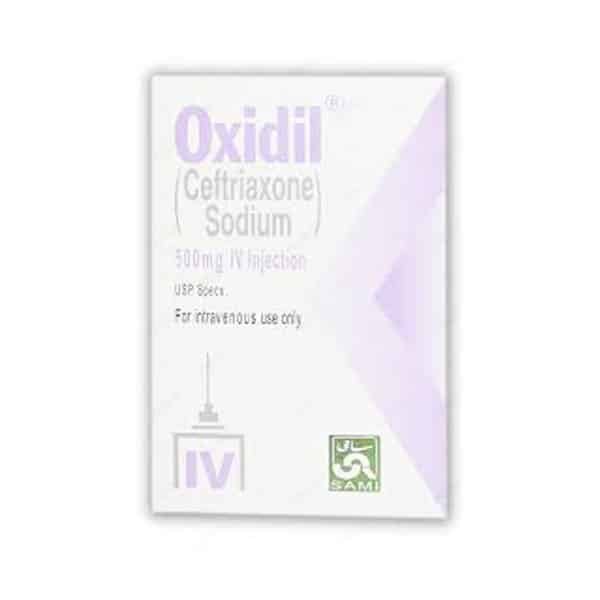delivery within 72 Hours
Oxidil 500mg IV Injection
₨ 325
Product Title: Oxidil 500mg Iv Injection
Generic: ceftriaxone
Pack Size: 1
Product Form: Injection
Delivery within: 2 to 3 working days across Pakistan
Shipping & Delivery
-
Courier delivery
Our courier will deliver to the specified address
2-3 Days
From Rs 250
-
Free 15-Day returns

Black Friday Blowout!
Description
Oxidil 500mg IV Injection is a sterile powder formulation containing ceftriaxone, a third-generation cephalosporin antibiotic. It is administered intravenously (IV) and is used to treat severe bacterial infections that are susceptible to ceftriaxone.
Uses:
Oxidil 500mg IV Injection is prescribed for the treatment of serious bacterial infections caused by susceptible organisms, including:
- Pneumonia: It is used to treat bacterial pneumonia caused by susceptible strains.
- Meningitis: Ceftriaxone is effective in treating bacterial meningitis, including meningococcal and pneumococcal meningitis.
- Septicemia: It is indicated for the treatment of septicemia (bloodstream infection) caused by susceptible bacteria.
- Intra-abdominal Infections: Ceftriaxone is used to treat intra-abdominal infections, such as peritonitis, caused by susceptible organisms.
- Skin and Soft Tissue Infections: It may be prescribed for the treatment of skin and soft tissue infections caused by susceptible bacteria.
Dosage and Administration:
The dosage of Oxidil 500mg IV Injection depends on the severity of the infection, the patient’s age, weight, and renal function. It is administered intravenously over a specified period as directed by a healthcare professional.
Precautions:
Before using Oxidil 500mg IV Injection, certain precautions should be considered:
- Hypersensitivity: Patients with a known allergy to ceftriaxone or other cephalosporin antibiotics should avoid its use.
- Renal Impairment: Dosage adjustment may be necessary in patients with impaired renal function to prevent the accumulation of ceftriaxone.
- Biliary Lithiasis: Ceftriaxone should be used with caution in patients with biliary lithiasis (gallstones) due to the risk of biliary pseudolithiasis.
Side Effects:
Common side effects associated with Oxidil 500mg IV Injection may include:
- Diarrhea
- Nausea or vomiting
- Rash or itching
- Headache
- Injection site reactions (pain, redness, swelling)
When Not to Use:
Oxidil 500mg IV Injection should not be used in the following circumstances:
- Hypersensitivity: Patients with a known hypersensitivity to ceftriaxone or any component of the formulation should avoid its use.
- Neonates with Hyperbilirubinemia: Ceftriaxone should not be used in neonates with hyperbilirubinemia, particularly those who are premature or receiving other medications that may increase bilirubin levels.
FAQ:
- How long does it take for Oxidil to work?
- The onset of action of ceftriaxone varies depending on the type and severity of the infection. Improvement in symptoms may be observed within 24 to 48 hours of treatment initiation.
- Can Oxidil be used to treat viral infections?
- No, Oxidil is an antibiotic and is not effective against viral infections such as the common cold or flu.
- What should I do if I miss a dose of Oxidil?
- If you miss a dose of Oxidil, contact your healthcare provider or follow their instructions regarding the missed dose.
- Can I drink alcohol while taking Oxidil?
- It is generally recommended to avoid excessive alcohol consumption while being treated with antibiotics, including ceftriaxone.
- Is it safe to use Oxidil during pregnancy or breastfeeding?
- Ceftriaxone may be used during pregnancy or breastfeeding if considered necessary by a healthcare professional. However, the benefits and risks should be carefully weighed before use.
Customer Reviews
You must be logged in to post a review.










Reviews
Clear filtersThere are no reviews yet.